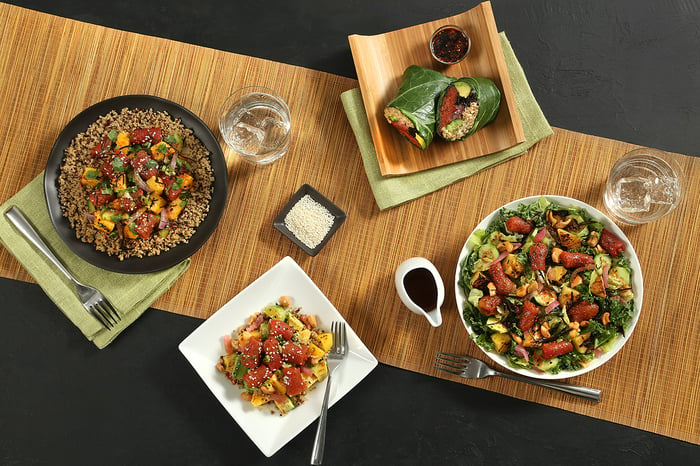
It chews, tastes, and looks like fish – but it’s actually made from a tomato! Ahimi, Ocean Hugger Food’s debut product, is a fully plant-based alternative to raw tuna. It’s made from just five clean, simple ingredients – tomatoes, soy sauce, sugar, sesame oil, and filtered water. The secret, founder David Benzaquen notes, is to eliminate the taste of tomato and create the chewy texture of raw fish. There are multiple plant-based fish alternatives in the market, but Ahimi is the first to replace raw tuna. And it sells wholesale for a third of the price of sushi-grade tuna.
Why replace tuna?
The development of Ahimi and the creation of Ocean Hugger Foods are a response to our global marine life crisis. National Geographic and The New York Times have reported that by 2048, there will be zero commercial fish of any species left in the ocean due to overfishing. The World Wildlife Fund warns that the capacity of current fishing infrastructure globally is 2-3x larger than global fish stocks and that 85 percent of the world’s fisheries are fully exploited or overexploited, depleted, or recovering from depletion. Meanwhile, demand for fish continues to increase.
A quick glance at the state of our oceans reveals the inherently problematic nature of fishing, wild or farmed. Wild-caught fishing takes fish out of a limited pool of animals in the ocean and poses a tremendous impact on the rest of the ecosystem due to by-catch. In other words, imagine a giant net scooping up every lion, giraffe, zebra, cheetah, and rhino in the savannah just to catch gazelles – that is what is happening in our oceans with commercial fishing.
What’s happening to marine ecosystems isn’t as visible to us as what’s happening on land. Aquaculture is often worse than wild fishing. Most species in fish farms are fed wild fish, and so the total outcome of calories produced versus consumed is negative – it takes 5 or more pounds of wild-caught fish to grow a single pound that is fed to people. And the tight quarters of fish farms mean that the pesticides, fungicides, herbicides, antibiotics, and hormones given to the fish to keep them from getting sick and spreading disease are actually leaching into the oceans and creating dead zones, algae blooms, and coral damage, since these farms are simply huge nets within the ocean.
Moving away from massive extraction
Ocean Hugger Foods began as a solution to the unsustainable and massive extraction of fish from the ocean. When Certified Master Chef James Corwell visited the Tsukiji Fish market in Japan (the largest fish market in the world), he was shocked by the scale of fish being sold – 4 million pounds of tuna daily! He then dedicated several years to create a plant-based alternative to tuna, and thus Ahimi was born. Benzaquen remarks that Ocean Hugger Foods was “founded by a world-famous chef with the goal that we would change the oceans only by putting forward the most beautiful and delicious food. That is central to everything we do.” There is no sacrifice being made to the oceans to make Ahimi, and it makes all the difference.
Isn’t raw tuna traditional for sashimi?
“The Japanese sushi experience is something so beautiful and historic, it needs to be maintained for many more years, but the way our oceans are going, it’s not possible unless we find new ways to create those textures and flavors.” – David Benzaquen

Raw tuna is an essential ingredient in Japanese cuisine, and yet Ahimi has been warmly welcomed by the Japanese. Ocean Hugger Foods’ first distribution deal was with a Japanese seafood company that is now their largest distributor. “Our customers are Japanese restaurants, poke restaurants, and chefs who are working with us on a daily basis. Ahimi is being celebrated by seafood chefs as something that deserves to be there. It’s prepared in the same way and creates that delicious sushi experience” says Benzaquen. The Japanese take an innovative approach by understanding that their cuisine is thousands of years in development, incorporating foods from all over the world. The five largest Japanese food distributors have requested to sell Ahimi.
Considering the environmental impact, alternatives like Ahimi provide an opportunity for traditional seafood companies to demonstrate a commitment to sustainability. Ahimi is also financially sustainable. For those in the seafood business, the price volatility of sushi-grade fish is extremely worrisome as the supply chain access to commercial fish is becoming more limited. And for chefs, introducing a plant-based option that’s also cheaper than sushi-grade tuna is an added benefit.
Beyond fish
The plant-based movement is rapidly gaining traction around the world. We find ourselves in a time of necessity sparking innovation for entrepreneurs, food scientists, and chefs to create new plant-based products. Regardless of what we would like to keep eating, we simply do not have enough land space or enough fish in the oceans to be able to keep eating animal proteins the way we have been. That means we’re going to have to consider how our diets will change.
Ahimi will be launching in the next few weeks in cafeterias at Google, Stanford University, LinkedIn, Twitter, SAP, and Wake Forest University, in addition to independent sushi and poke restaurants. You can already find Ahimi at Whole Foods in New York and Los Angeles. It’s also available online through Veestro, a plant-based meal delivery service. As Ocean Hugger Foods scales up its production, the product will be launched beyond North America beginning with Europe and Asia.
Ocean Hugger Foods has more products in the pipeline, including plant-based alternatives for unagi (eel) and sake (raw salmon). Called Unami and Sakimi, these names refer to the spirit of the fish and are about more than just ground-breaking food science. Benzaquen notes:
“Every time you sit down to eat, you can make an incredible decision to improve your health, protect animals and the environment. Whether it’s something you do every meal or every so often, it’s all about making conscious decisions and giving it a shot. It’s about the gift of being able to make a difference, and being able to enjoy delicious food together.”









